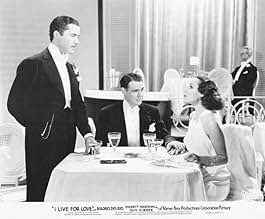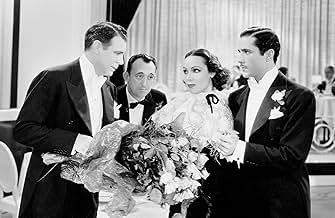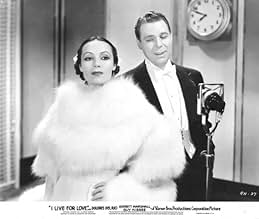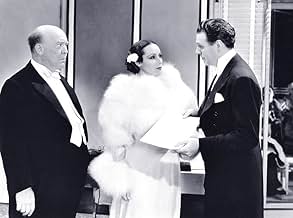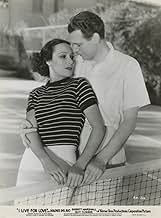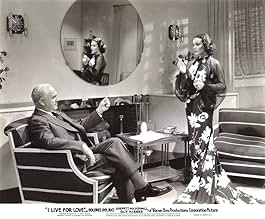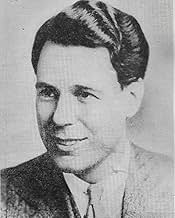Añade un argumento en tu idiomaDonna (Del Rio) is a diva of the stage and wants her lover Rico (Alvarado) as her leading man. To keep this from happening, the producers (Churchill, Cavanaugh) grab Roger Kerry (Marshall) o... Leer todoDonna (Del Rio) is a diva of the stage and wants her lover Rico (Alvarado) as her leading man. To keep this from happening, the producers (Churchill, Cavanaugh) grab Roger Kerry (Marshall) off the street and say he has a contract.Donna (Del Rio) is a diva of the stage and wants her lover Rico (Alvarado) as her leading man. To keep this from happening, the producers (Churchill, Cavanaugh) grab Roger Kerry (Marshall) off the street and say he has a contract.
- Dirección
- Guión
- Reparto principal
Dolores Del Río
- Donna Alvarez
- (as Dolores Del Rio)
Al Shaw
- Street Musician
- (as Shaw)
Sam Lee
- Street Musician
- (as Lee)
Robert Greig
- Fat Man Dancing at Nightclub
- (as Robert Grieg)
Miki Morita
- Toyo - Roger's Butler
- (as Mike Morita)
William A. Boardway
- Party Guest
- (sin acreditar)
Nick Copeland
- Stage Manager
- (sin acreditar)
Lester Dorr
- Assistant Ticket Seller
- (sin acreditar)
Frank Du Frane
- Actor at Audition
- (sin acreditar)
Bill Elliott
- Minor Role
- (sin acreditar)
Reseñas destacadas
Way too much of opera singer Everett Marshall, not nearly enough of Dolores del Río. It's really a shame she didn't get better parts during her career, but at least she isn't forced to play into stereotypes in this role. The film suffers from a lack of humor, charm, and romantic chemistry though, and also from having been made after the Production Code went into place. Don't expect any flashy musical numbers, despite direction from Busby Berkeley either. Just a total blah.
Stage diva Donna Alvarez (Dolores del Rio) wants her fawning lover Rico Cesaro (Don Alvarado) to be her leading man. Her producer pretends to agree and tells her that another actor has a signed contract to be the lead. He picks Roger Kerry (Everett Marshall) randomly to be that man. Roger is a terrible actor and quits. He's a street singer and gains fame for turning down Donna. He is followed by three fellow street performers.
Busby Berkeley is the director but there are no big dance numbers. It's mostly singing especially from opera singer Everett Marshall who did some film work. I don't particularly like either Donna or Roger. She's snooty and he's a stiff on the screen. Snooty can work in a combative rom-com. Stiffness cannot be overcome. This is a love-hate relationship without the love. The switch comes out of nowhere. The movie wants them together more than I do. I don't live for this love.
Busby Berkeley is the director but there are no big dance numbers. It's mostly singing especially from opera singer Everett Marshall who did some film work. I don't particularly like either Donna or Roger. She's snooty and he's a stiff on the screen. Snooty can work in a combative rom-com. Stiffness cannot be overcome. This is a love-hate relationship without the love. The switch comes out of nowhere. The movie wants them together more than I do. I don't live for this love.
The stars are foils for the fabulous supporting cast in this film --big name stars in the credits an hilarious reference to one of the movie's plot mechanisms, in which a big name star supposedly adds luster to a radio program. The supporting cast stars in this film, an acerbic send up of show business, both theater and newly popular radio. The film smacks by-then-dead vaudeville, then places both high toned "thea-tuh" and radio in the same category. With focus almost entirely on the supporting cast, who have all the great lines and embody the satire, the film moves at a good clip, challenging us not to give a hoot about the "stars'" love story. I found this film absolutely hysterical and laughed out loud through the whole thing.
...but I was somewhat perplexed. This movie might have been OK if someone other than Everett Marshall had been the leading man - say Dick Powell for example. Mr. Marshall was an excellent singer but had absolutely no chemistry as a leading man here and therefore no chemistry with lead Delores Del Rio. What were they thinking when he was cast as a romantic lead? Fortunately, Marshall is given frequent opportunities to exercise his excellent vocal chords. Unfortunately, a big part of the plot is Marshall's character, up and coming radio star Roger Kerry, feuding with Del Rio's character, dramatic actress Donna Alvarez - for apparently no reason. This is followed by the pair abruptly falling madly in love - again, with apparently no reason and no build up. Of course the pair's radio sponsors are pleased when a romance sparks between the two - it means great publicity. However, these same sponsors are equally displeased when the two decide to wed. Corporate meddling in affairs of the heart and complications ensue.
Although directed by Busby Berkeley, you won't see any of the hallmarks of Berkeley's films in which he was dance director. There are no big numbers of any kind. There is a very annoying number in the middle of the film that I had to finally fast forward to get through - "A Man Has To Shave". It's made annoying by the attempts made at comedy throughout the number by the three street singers that accompany Kerry from unemployed singer to stardom. The Three Stooges these three are not.
The positives in this film include the excellent comic support - and by support I do mean they're carrying this thing - given by reliable contract Warner Brothers players Allen Jenkins and Guy Kibbee. This film is a good example of the many B and B- features all of the studios churned out in support of their bigger and fewer A releases, which is a custom that continued until TV took away the audiences for the multitude of smaller films such as this one.
Although directed by Busby Berkeley, you won't see any of the hallmarks of Berkeley's films in which he was dance director. There are no big numbers of any kind. There is a very annoying number in the middle of the film that I had to finally fast forward to get through - "A Man Has To Shave". It's made annoying by the attempts made at comedy throughout the number by the three street singers that accompany Kerry from unemployed singer to stardom. The Three Stooges these three are not.
The positives in this film include the excellent comic support - and by support I do mean they're carrying this thing - given by reliable contract Warner Brothers players Allen Jenkins and Guy Kibbee. This film is a good example of the many B and B- features all of the studios churned out in support of their bigger and fewer A releases, which is a custom that continued until TV took away the audiences for the multitude of smaller films such as this one.
The generic, meaningless tile is a tip-off. Everett Marshall has no screen presence. He may have been a popular radio singer but what he's given here is dull and repetitious.
The ravishing Dolores del Rio is made up too heavily and essentially miscast. Lupe Velez, who was at another studio, would have been much for fun. So would any number of Warner Brothers stars. Glenda Farrell, Winifred Shaw, Joan Blondell -- all of them could play temperamental divas in their sleep.
It's hard to think hat Busby Berkeley had anything to do with this movie, which has no real dancing and has no style. It would have been better, right from the start, had there been a couple other female characters. Del Rio has no one to bounce off. And Marshall certainly is no help.
The ravishing Dolores del Rio is made up too heavily and essentially miscast. Lupe Velez, who was at another studio, would have been much for fun. So would any number of Warner Brothers stars. Glenda Farrell, Winifred Shaw, Joan Blondell -- all of them could play temperamental divas in their sleep.
It's hard to think hat Busby Berkeley had anything to do with this movie, which has no real dancing and has no style. It would have been better, right from the start, had there been a couple other female characters. Del Rio has no one to bounce off. And Marshall certainly is no help.
¿Sabías que...?
- CuriosidadesJane Froman is in studio records/casting call lists but did not appear in the movie. A modern source lists many actors in the cast, but the following were not seen: Betty Farrington, Bess Flowers', Mary Marsh, Gertrude Astor (all as Interviewers), 'Bill Elliott' (Friend) and Florence Fair (Dowager). It is probable that these were cut from the final release print, since it is listed as an 8-reel film, yet it is also listed for only a 64-minutes running time.
- Banda sonoraI Live for Love
(1935) (uncredited)
Music by Allie Wrubel
Lyrics by Mort Dixon
Sung by Everett Marshall at the radio show
Copyright 1935 by M. Witmark & Sons
Selecciones populares
Inicia sesión para calificar y añadir a tu lista para recibir recomendaciones personalizadas
Detalles
- Duración
- 1h 4min(64 min)
- Color
- Mezcla de sonido
- Relación de aspecto
- 1.37 : 1
Contribuir a esta página
Sugerir un cambio o añadir el contenido que falta

